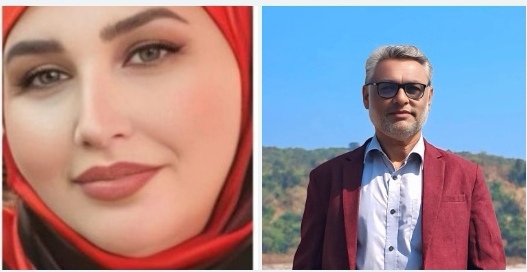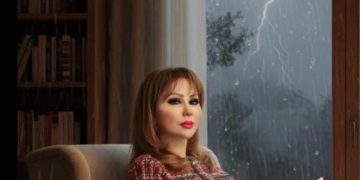تمهيد إلى الفلسفة ما بعد الحداثية – الجزء التاسع
بقلم شيكدار محمد كبرياه
بين رؤى روسو وإرث الفلسفة الحديثة: هل نجح شيكدار محمد كبرياه في إيصال فكرته للقارئ؟
قراءة تحليلية أدبية فلسفية بقلم الشاعرة والمترجمة اللبنانية البرازيلية تغريد بو مرعي
قدّم هذا المقال حول فكر جان جاك روسو رؤية فلسفية مكثّفة تتجاوز العرض المباشر للأفكار إلى الغوص في جوهر التحوّل الذي مثّله هذا المفكر في تاريخ الفكر الإنساني. والقراءة الأدبية–الفلسفية لهذا النص تكشف عن مساحة واسعة من الأسئلة التي يثيرها الكاتب، سواء حول المعرفة أو الحرية أو الدين أو حدود الدولة، وتكشف كذلك عن أثر روسو الذي ما يزال حيًّا في النقاشات الفكرية الحديثة. فالمقال لا يتعامل مع روسو كشخصية تاريخية جامدة، إنما كصوت فكري لا يزال يتردّد في شقوق العالم المعاصر، ويستمر في طرح الأسئلة ذاتها التي حيّرت العقل الإنساني: ما مصدر الحقيقة؟ وما جذور الشر؟ وكيف ينهض الإنسان على ذاته؟ وهل المعرفة عقل محض، أم شعور ينبض في عمق الكائن؟
ففي البنية العميقة للمقال نرى أن الكاتب يقدّم روسو كظاهرة إنسانية تحاول أن تعيد تعريف العلاقة بين الفرد وذاته وبين الفرد والعالم. يظهر روسو في النص كمن يحمل شعلة تتقد بين يديه بين العاطفة والعقل، شعلة لا تنتمي إلى المدرسة العقلانية البحتة ولا إلى الحسّية التجريبية، ولكن تنتمي إلى فضاء ثالث يمكن وصفه بأنه فضاء “الإنسان الكامل”، الذي يتعانق فيه الفكر والشعور، ويتحوّل فيه الوجدان إلى وسيلة معرفية لا تقل أهمية عن العقل. وهذه الرؤية، بحد ذاتها، تعيدنا إلى السؤال الكبير الذي واجهته الفلسفة منذ بداياتها: هل تكفي القدرة على التفكير لتأسيس معرفة؟ أم أن المعرفة فعل وجودي لا يتحقق إلا حين يتورّط الكائن بكل طاقته الوجودية في اكتشاف الحقيقة؟
يعرض المقال روسو من زاوية تمزج بين النقد والتحليل، فيكشف القارئ كيف يقوم هذا الفيلسوف برفض المسلّمات التي كانت تحكم عصره. فهو لا يهاجم العلم والفن من باب العداء لهما، إنما لأنه يراها مشاريع تحوّلت إلى أدوات للترف، وباتت تعزل الإنسان عن فطرته الأصلية وعن حقيقته البسيطة. هذا الرفض هو تجديف ضدّ حضارة مزيّفة، حضارة قطعت الإنسان عن جذوره الروحية وألقت به في دوامة من الاستهلاك والرغبة والمظاهر، وليس رفضًا للحضارة. المقال يضيء هذا الجانب بطريقة تجعل القارئ يستشعر أن نقد روسو يمكن أن يُقرأ الآن، في القرن الحادي والعشرين، وكأنه نقد لحياتنا المعاصرة التي تتضخم فيها التقنية وتضيع فيها القيم، وتزداد فيها المسافة بين الإنسان ونفسه.
ويتخذ النص مسارًا فلسفيًا آخر حين يسلّط الضوء على علاقة روسو بالدين. فهنا يبرز المفهوم الذي يعدّ من أكثر الأفكار إثارة للجدل في فلسفة روسو: الدين الطبيعي. هذا التصوّر القائم على الإيمان بالله وخلود الروح وحرية الإرادة لا يأتي في سياق لاهوتي، إنما يأتي في إطار أخلاقي يبحث عمّا يجعل الإنسان قادرًا على بناء عالم تسوده المساواة والحرية. والمقال ينجح في تقديم هذا الموقف بوصفه دعوة إلى أن يكون الإيمان تجربة داخلية، لا مؤسسة سلطوية. ولذلك، فإن نقده للديانات المؤسّسة هو رفضًا لتشويهه عبر السلطة، وتحويله إلى شكل يُستخدم لقهر الإنسان بدل تحريره، وليس رفضًا للدين. وهذه الفكرة، حين تُقرأ أدبيًا، تصبح أشبه بنداء داخلي للعودة إلى الإيمان كبصيرة، لا كمؤسسّة.
ولا يقف المقال عند حدود الدين، إنه ينفذ إلى جوهر الحرية كما فهمها روسو. فحرية الإرادة ليست مجرّد فضيلة أخلاقية، هي في نص الكاتب، نقطة الانعطاف التي تميّز الإنسان عن بقية الكائنات. إن اعتقاد روسو بأن الفكر فعل حرّ، وأن الانسان “مؤلف أفكاره”، كما ينقل المقال، يجعل المعرفة فعل خلق، لا فعل نقل. وهذا البعد الأدبي–الفلسفي في المقال يمنح النص طاقة وجودية لافتة، إذ يتحوّل الإنسان إلى كائن يصنع ذاته، ويكتب مصيره، ويتحمّل مسؤولية رؤيته للعالم.
يمتد أثر المقال إلى الإضاءة على البعد السياسي في فكر روسو، وهو البعد الأكثر خطورة وتفجّرًا. فحين يفكّك الكاتب مفهوم السيادة الشعبية وحق الشعب في الثورة، فإنه لا يقدّم درسًا في الفلسفة السياسية فحسب، هو يشير إلى الجرح المفتوح في التاريخ البشري: من يملك السلطة؟ ومن يحق له أن يحكم؟ ومتى يتحوّل الحكم إلى استبداد؟ وكيف يصبح التمرّد فعل حياة لا فعل عنف؟ ما يميز هذا التحليل هو أنه يتجنّب النبرة الأكاديمية الجامدة، ويقدّم هذه الأسئلة بلغة إنسانية، تجعل القارئ يشعر أن فكر روسو هو جزء من مشكلاتنا اليومية مع العالم ومع ذواتنا، وليس جزءًا من ماضٍ بعيد.
أما من الناحية الثقافية، فإن المقال يقدّم روسو بوصفه ضميرًا مضادًا للمادية والإلحاد الأخلاقي الذي بدأ يتفشّى في عصره، وما زال يتفشّى في عصرنا. ينجح الكاتب في رسم صورة لرجل يقف وحده في مواجهة التشيؤ والتجريد، ويدعو الإنسان للعودة إلى إنسانيته عبر شعوره لا عبر أدواته. وهذا البعد الأدبي يتجلّى في الطريقة التي يربط بها الكاتب بين روسو وبين التأثيرات التي أحدثها في الفكر الألماني وفي المدرسة الرومانسية، وكأن روسو كان الشرارة الأولى التي أعادت للإنسان حقّه في الشعور، بعد أن حاصرته العقلانية الصارمة لقرون طويلة.
وما يضيفه المقال إلى الساحة الثقافية هو هذه القدرة على إعادة إطلاق النقاش حول مصادر المعرفة: فمن أين تأتي الحقيقة؟ هل تأتي من العقل وحده؟ أم من التجربة الحسيّة؟ أم من القلب؟ يبدو المقال منحازًا لرؤية روسو التي ترى الإنسان ككلّ متكامل، لا كعقل منفصل عن جسده وروحه. من هذه الزاوية، يصبح النص نفسه مشاركة في النقاش الفلسفي حول ما بعد الحداثة، لأن ما بعد الحداثة في جزء منها هي رفض الواحدية، واحتفاء بالتعدّد، وتشكيك بمركزية العقل الخالص.
ولعل القيمة الأجمل في المقال هي تلك التي تتخفّى في سطوره: أن الإنسان، في نهاية المطاف، ليس عقلًا مجردًا، ولا شهوة عابرة، ولا آلة إنتاج، هو كائن يبحث عن معنى وجوده عبر شبكة من الحواس والأفكار والانفعالات. والكاتب، من خلال إعادة قراءة روسو بهذه الطريقة الأدبية–الفلسفية، يعيد للقارئ صلته بأعمق سؤال يمكن أن يطرحه الإنسان على نفسه: كيف أعرف؟ ولماذا أؤمن؟ وما الذي يجعل حياتي تستحق أن تُعاش؟
بهذا المعنى، يصبح المقال إضافة ثقافية مهمّة، لأن قيمته لا تكمن في المعلومات التي يقدّمها عن روسو، إنها تكمن في الشرارة الفكرية التي يطلقها في ذهن القارئ. إنه نص يعيد فتح الجروح القديمة للفلسفة، ويذكّرنا بأن الحقيقة ليست فكرة نصل إليها، هي رحلة نعيشها. وإن كان روسو قد أعاد للإنسان حقّه في الشعور، فإن هذا المقال يعيد لقراءته حقّها في التأمّل، ويجعل من فكره مادة حيّة تتحرّك في فضاء الثقافة المعاصرة، وتمنحها بعدًا إنسانيًا يتجاوز الزمان والمكان.
A PRE-TEXT TO POSTMODERN PHILOSOPHY – PART 9
By SHIKDAR MOHAMMED KIBRIAH
Between Rousseau’s Vision and the Legacy of Modern Philosophy: Did Shikdar Mohammed Kibriah Succeed in Conveying His Idea to the Reader?
LITERARY–PHILOSOPHICAL ANALYSIS
By TAGHRID BOU MERHI, Lebanese–Brazilian Poet and Translator
This article on the thought of JEAN-JACQUES ROUSSEAU offers an intense philosophical vision that goes beyond presenting ideas to explore the essence of the transformation this thinker brought to the history of human thought. A literary–philosophical reading of the text reveals a wide space of questions raised by the author—questions about knowledge, freedom, religion, and the limits of the state, while also highlighting the enduring influence of Rousseau in modern intellectual debates. The article does not treat Rousseau as a static historical figure, but rather as an intellectual voice still echoing through the cracks of the contemporary world, continually posing the same questions that have challenged the human mind: What is the source of truth? What are the roots of evil? How does a person rise upon the foundation of the self? And is knowledge a pure rational act, or a pulsating feeling at the core of the human being?
In the deeper structure of the article, the author presents Rousseau as a human phenomenon attempting to redefine the relationship between the individual and the self, and between the individual and the world. Rousseau appears as someone carrying a flame ignited between emotion and reason, a flame belonging neither to strict rationalism nor to empirical sensualism. It belongs instead to a third realm, one that can be described as the realm of the “complete human,” where thought and feeling intertwine, and where sentiment becomes a genuine means of knowledge no less important than intellect. This vision returns us to the ancient philosophical question: Is the ability to think sufficient to establish knowledge? Or is knowledge an existential act that emerges only when the human being commits all the forces of existence to the discovery of truth?
The article presents Rousseau through a lens that blends critique and analysis, revealing how he challenged the dominant assumptions of his era. He did not attack science and art out of hostility, but because he saw them as projects that had transformed into instruments of luxury, isolating human beings from their original nature and simple truth. His rejection is a rebellion against a counterfeit civilization, a civilization that severed humans from their spiritual roots and trapped them in a vortex of consumption, desire, and appearances, rather than a rejection of civilization itself. The article illuminates this idea in a way that allows the reader to sense that Rousseau’s critique could be read today, in the twenty-first century, as though it were addressed to our contemporary lives in which technology expands, values diminish, and the distance between human beings and their inner selves grows.
The text takes another philosophical path by shedding light on Rousseau’s view of religion. Here emerges one of the most controversial concepts in his thought: natural religion. This concept, based on belief in God, the immortality of the soul, and free will does not appear in a theological context but in an ethical one that seeks to identify what enables humans to build a world governed by equality and freedom. The article succeeds in presenting this stance as a call for faith to become an inner experience rather than an institutional authority. Rousseau’s criticism of established religions is therefore not a rejection of faith itself, but a rejection of how authority distorts it and transforms it into a tool of oppression rather than liberation. When read literarily, this idea becomes an inner call to return to faith as intuition rather than institution.
The analysis does not stop at religion; it penetrates into the essence of freedom as understood by Rousseau. Free will is not merely a moral virtue but the turning point that distinguishes humans from all other beings. Rousseau’s belief that thought is a free act and that the human being is “the author of his own thoughts,” as the article conveys, turns knowledge into an act of creation rather than transmission. This literary–philosophical dimension grants the text a notable existential energy, transforming the human being into a creator of the self, a writer of destiny, and a bearer of responsibility for one’s vision of the world.
The article also highlights the political dimension of Rousseau’s thought, the most explosive and dangerous aspect of his philosophy. When the author dissects the concept of popular sovereignty and the people’s right to revolution, he is not merely offering a lesson in political theory. He is touching on the open wound of human history: Who owns power? Who has the right to rule? When does governance turn into tyranny? And how does rebellion become an act of life rather than an act of violence? What distinguishes this analysis is its avoidance of rigid academic tone, presenting these questions with human sensitivity that makes the reader feel that Rousseau’s ideas are part of our daily struggle with the world and with ourselves, not relics of a distant past.
Culturally, the article portrays Rousseau as a conscience resisting the rise of materialism and moral atheism that emerged in his era and continues to spread in ours. The author succeeds in painting a portrait of a man standing alone against the forces of objectification and abstraction, calling humanity back to its inner truth through feeling, not through mechanical tools. This literary dimension is evident in the way the article connects Rousseau’s influence to German thought and the Romantic movement, as if he were the spark that restored to humanity its right to feel after centuries of strict rationalism.
The article contributes to the cultural sphere by reigniting the debate over the sources of knowledge: Where does truth come from? From reason alone? From sensory experience? From the heart? The text seems inclined toward Rousseau’s holistic view of the human being, not as a mind detached from body and soul, but as an integrated unity. From this angle, the article becomes part of the philosophical conversation about postmodernism, which in many ways rejects singularity, embraces plurality, and questions the centrality of pure reason.
Perhaps the article’s greatest value lies in what is hidden between its lines: the idea that the human being is not a mere abstract intellect, nor a fleeting impulse, nor a machine of production. Human existence is a journey, a quest for meaning through a constellation of sensations, thoughts, and emotions. Through this literary–philosophical rereading of Rousseau, the author restores the reader’s connection with the deepest questions one can ask: How do I know? Why do I believe? What makes life worth living?
In this sense, the article becomes an important cultural contribution not for the information it presents about Rousseau, but for the intellectual spark it ignites. It reopens the ancient wounds of philosophy and reminds us that truth is not a destination but a journey. If Rousseau restored to humanity its right to feel, then this article restores to the reading of Rousseau its right to contemplation, transforming his thought into a living force that moves within the contemporary cultural sphere and gives it a human depth beyond time and place.





















